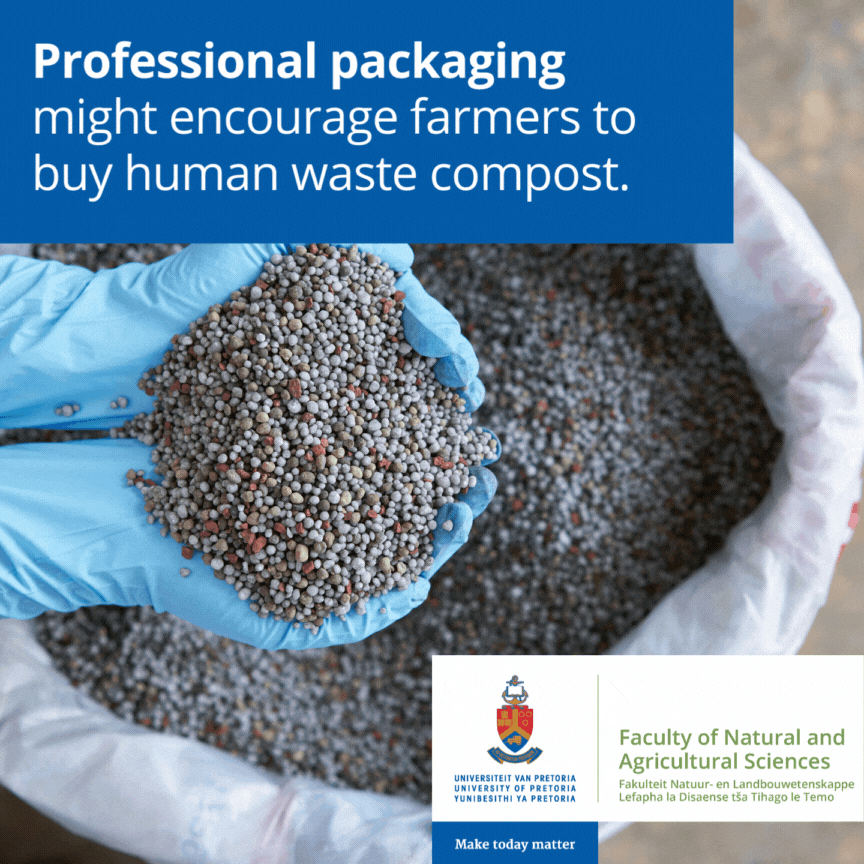UP-UKZN study investigates likelihood of farmers choosing compost made of human poop
University of Pretoria (UP) researchers lent their expertise to a recent study led by the University of
KwaZulu-Natal and found that rural farmers in KwaZulu-Natal are open to buying and using compost made
from human sewage as long as they can be sure that it is safe, affordable and works as well as other
products on the market.
The researchers asked 341 farmers what influenced their choice of fertiliser or compost, and presented a
compost made from human waste as a potential choice.
Dr Simon Gwara of the University of KwaZulu-Natal led the study, which was co-authored by Dr Damien
Jourdain of UP’s Department of Agricultural Economics, Extension and Rural Development. Dr Gwara called
on UP researchers to assist with data analysis using a method called “choice experiments”. These
experiments allow researchers to understand consumer choices based on how much they value specific
characteristics of products, explains Dr Jourdain, an expert in choice experiments and choice modelling.
The research team looked into whether farmers were concerned about the packaging of human compost,
whether or not it was fortified with additional nutrients, and investigated potential health and safety risks.
“We found that farmers cared more about fortification and certification of human compost,” Dr Gwara
says. “Perceived health risks were a potential barrier to the use of compost in agriculture; therefore,
certification would mitigate some of the safety concerns.”
Overall, the findings suggest that faecal sludge management businesses and other entrepreneurs within
the waste value recovery chain should create human compost products that are more acceptable to
farmers. For example, human waste can be co-composted with other organic waste to ensure that it is
fortified with the proper nutrients and minerals. It could also be sold as pellets in packaging that resembles
other commercial composts so that it doesn’t remind farmers of human waste.
Clear safety certifications can also be placed on the products to put farmers’ minds at ease with regard to
any real or perceived risks of using human poop as compost.
Dr Gwara had recognised the potential of the choice experiments approach for this study, and reached out
to UP to collaborate on the design and analysis of the study after attending a seminar presented by Dr
Jourdain at the University in 2018. UP’s Dr Thomas Lundhede, an extraordinary professor in environmental
economics, was another co-author of the research.
Dr Gwara was prompted to understand what consumers might value in human compost products by the
realisation that such products could help address several critical socio-economic issues, including waste
management, sanitation, agriculture and climate change mitigation.
This study is a first step towards creating human compost products that are more agreeable to farmers,
and is an excellent example of how versatile and useful choice experiments are for market research, says
Dr Jourdain.
Dr Jourdain and his colleagues at UP have been working with PhD students across South Africa since that
2018 seminar to build capacity in choice experiments for agricultural economics, alongside
UP’s Department of Agriculture Economics, Extension and Rural Development, and the University’s Centre
for Environmental Economics and Policy in Africa.
“Personally, this work is very important to me, and I hope to establish a community of practice in South
Africa through these student networks and with other people doing work on choice experiments,” Dr
Jourdain says.
He says choice experiments are used widely elsewhere in the world, but that they are only emerging in
Africa. Some of his students are using choice experiments to study preferences around pasture
insurance, illegal hunting and even rewilding animals in national parks. Many others are using choice
experiments in health research.
“It’s quite versatile for very different settings to evaluate the diversity of preferences of different
populations,” Dr Jourdain says.
He cautions, however, that this approach is based on hypothetical choices, so the research must be
carefully crafted to minimise bias in respondents’ preferences.
“In the case of human compost pellets, we are talking about a product that does not exist yet,” he says.
“People may say they would buy it, but in practice, when the products arrive, they might not.”
Dr Jourdain says the next step for human compost market research might be to offer an actual test
product at an auction where the real buying behaviour of consumers can be observed.
In the meantime, Dr Jourdain is looking forward to building more skills in choice experiments in South
Africa and watching how young researchers like Dr Gwara successfully use the method in their work.

